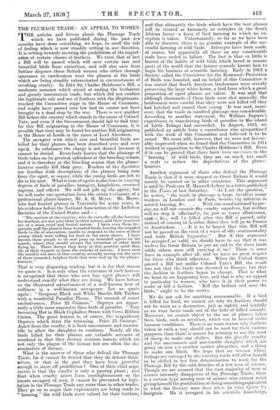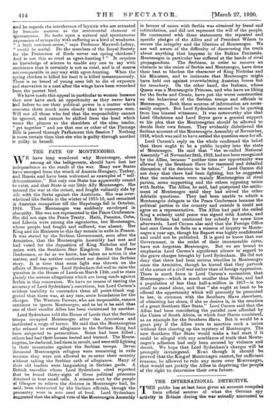THE PLUMAGE TRADE: AN APPEAL TO WOMEN.
r"HE articles and letters about the Plumage Trade which we have published during the past few months have done something, we hope, to swell the tide of feeling which is now steadily setting in one direction. It is setting towards securing the prohibition of the import- ation of certain classes of feathers. We trust that at last a Bill will be passed which will save certain rare and beautiful birds from extinction, and will also save from That is very disgusting reading, but it is for that reason we quote it. It is only when the existence of such horrors is recognized that those who now buy egret plumes will understand exactly what they are doing. We have before us the illustrated advertisement of a well-known firm of milliners in a well-known newspaper. Let us quote again : "Gorgeous Black and White Broche Silk Turban with a wonderful Paradise Plume. The summit of smart exclusiveness. Price 22 Guineas." Ospreys are appar- ently a little more expensive than birds of paradise. "Very becoming Hat in Black Cephaline Straw with Ceres Ribbon Crown. The great feature is, of course, the magnificent Ospreys which form the trimming. Price 25 Guineas." Apart from the cruelty, it is both uneconomic and unscien- tific to allow the slaughter to continue. Nearly all the birds killed for their plumes are valuable servants of mankind in that they destroy noxious insects which are not only the plague of the farmer but are often the dis- seminators of disease.
What is the answer of those who defend the Plumage Trade, for it cannot be denied that they do defend them- selves, or that in the past they have been powerful enough to stave off prohibition ? One of their chief argu- ments is that the cruelty is only a passing phase ; and that when cruelty arises ftom unenlightenment or the innate savagery of men, it cannot be prevented by legis- lation in the Plumage Trade any more than in other trades. They go on to argue that experiments are being made in " farming " the wild birds most valued for their feathers, further disgrace those British women who either through ignorance or carelessness wear the plumes of the birds which are being steadily exterminated in circumstances of revolting cruelty. In 1914 Sir Charles Hobhouse's Bill, a moderate measure which aimed at ending the barbarous and grossly uneconomic trade, but which did not confuse the legitimate sale and use of feathers with the illegitimate, reached the Committee stage in the House of Commons, and might have passed into law had its course not been brought to a dead stop by the war. There is now another Bill before the country which stands in the name of Colonel Yate, and even if the Government should fail to find time for this Bill originating in the House of Commons, it is possible that time may be found for another Bill originating in the House of Lords in the name of Lord Aberdeen.
The savagery with which rare and beautiful birds are killed for their plumes has been described over and over again. In substance the charge is not denied because it cannot be denied. Everybody knows that the plumage of birds takes on its greatest splendour at the breeding season, and it is therefore at the breeding season that the plume- hunters mostly kill their prey. Readers of the Spectator are familiar with descriptions of the plumes being torn from the egret, or osprey, while the young birds are left to die in the nest. What is true of egrets is also true in varying degrees of birds of paradise, tanagers, kingfishers, crowned pigeons, and others. We will not pile up the agony, but we will make one quotation from the sworn testimony of a professional plume-hunter, Mr. A. H. Meyer. Mr. Meyer, who had hunted plumes in Venezuela for many years, in his evidence before the National Association of the Audubon Societies of the United States said :— "The natives of the country, who do virtually all the bunting for feathers, are not provident in their nature, and their practices are of a most cruel and brutal nature. I have seen them fre- quently pull the plumes from wounded birds, leaving the crippled birds to die of starvation, unable to respond to the cries of their young which were calling for food in the nests above. I have known these people to tie and prop up wounded egrets on the marsh, where they would attract the attention of other birds flying by. These decoys they keep in this position until they die of their wounds or from the attacks of insects. I have seen the terrib7e red ants of that country actually eating out the eyes of these wounded, helpless birds that were tied up by the plume- hunters." and that ultimately the birds which have the best plumes will be treated as humanely as ostriches in the South African farms—a form of bird farming to which no ex- ception is taken. Unfortunately, so far as we have been able to discover, there is no genuine example of the suc- cessful farming of wild birds. Attempts have been made, of course, but apparently all those on any considerable scale have ended in failure. The fact is that so little is known of the habits of wild birds which breed in remote parts of the world that the farmer scarcely knows how to begin his business of scientific farming. Early in 1913 a Society called the Committee for the Economic Protection of Birds was founded, and on behalf of this Committee it was stated that South American landowners were strictly preserving the large white heron, a bird from which a great proportion of egret plumes are taken. It was said that although thousands of these birds were shot annually, the landowners were careful that they were not killed till they had hatched and reared their young. It was said, more- over, that the trade in moulted plumage was considerable. According to another statement, Sir William Ingram's experiment in transferring birds of paradise to the island of Little Tobago had succeeded. In August, 1913, we published an article from a contributor who sympathized with the work of this Committee and believed it to be sound. We must add, however, that we were not favour- ably impressed when we found that the Committee in 191t worked in opposition to Sir Charles Hobhonse's Bill. Even if it can be proved that there have been successes in the " farming " of wild birds, they are on much toe small a scale to reduce the depredations of the plume- hunters.
Another argument of those who defend the Plumage Trade is that if it were stopped in Great Britain it would merely be carried on' in other countries. This argument is used by Professor H. Maxwell-Lefroy in a letter published in the Times of last Saturday. As I see the question," he writes, "the trade in plumage is large, involves many workers in London and in Paris, besides big interests in ostrich farming, &c. . . . With our usual national hypoc- risy,we will not commit the cruelty ourselves, but neither will:we stop it effectual'.y, for just as many albatrosses, egro3, &e., will le killed after this Bill is passed, only instead of coining to L3ndon direct they will go to France or Amsterdam. . . . It is to be hoped that this Bill will not be passed on the crest of a wave of silly sentimentality and truly British hypocrisy." But if this argument be accepted as valid, we should have to say that it was useless for Great Britain to put an end to the slave trade while others were still carrying it on ! There is some force in example after all, and we have no great respect for those who think otherwise. When the United States passed a Bill not unlike Colonel Yate's Bill, the result was not that the trade was diverted to Europe, but that the.fashion in feathers began to change. That is what we want to see happening here, and that is why we appeal in particular to women, who have it in their power to make or kill a fashion. "Kill the fashion and save the birds," ought to he the motto.
We do not ask for anything unreasonable. If a bird is killed for food, we cannot see why its feathers should not be worn as a decoration, just as rightly and lawfully as we wear boots made out of the hide of killed animals. Moreover, we cannot object to the use of plumes taken from birds, such as ostriches, which can be farmed under humane conditions. There is no more reason why feathers taken in sdch a way should not be used for their various purposes than there is reason for refusing to use the wool of sheep to make our clothes. But the ghastly cruelty and the uneconomic and unscientific slaughter which are going on now a:e another matter altogether, and a thing to make one blush. We hope that no woman whose feelings are outraged by the existing trade will allow herself to be chilled in her firm determination to work for the Plumage Bill by the cold douches of a few men of science. Though we are assured that the vast majority of men of science intensely disapprove of the Plumage Trade, there is a certain type among men of science who cannot resist giving himself the gratification of doing something equivalent to what the literary man does when he tries epater les bourgeois. He is arrogant in his scientific knowledge, and he regards the interference of laymen who are actuated by humane motives as the sentimental clamour of ignoramuses. He looks upon a natural and spontaneous expression of sympathy with suffering as a kind of weakness. "A little common-sense," says Professor Maxwell-Lefroy, "would be useful. Do the members of the Royal Society for the Protection of Birds never eat spring chickens? And is not this as cruel as egret-hunting ? " It requires no knowledge of science to enable any one to say with confidence that it certainly is not as cruel, and is of course not comparable in any way with egret-hunting. When the spring chicken is killed for food it is killed instantaneously. There is no r brood of young ones left to die of exposure and starvation in a nest after the wings have been wrenched from the parent bird.
We have made this appeal in particular to women because they now have such an opportunity as they never have had before to use their political power in a matter which concerns them -much more closely than it concerns -men. Will not all those Who +feel that the responsibility cannot be ignored, and cannot be shifted from the head which wears the plumes to ' the shoulders of the alien trader, "get together "-and see that one or other of the Plumage Bills is passed through Parliament this Session ? Nothing is more certain than that she-who is guilty-through another is guilty in herself.



































 Previous page
Previous page